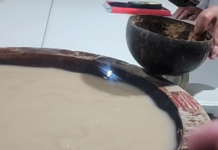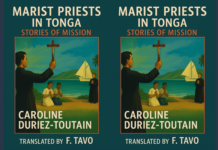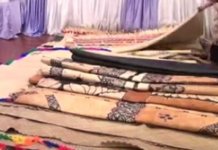Lupe Puloka, 26, and her daughter Deborah, 2, at home: ‘When I see my auntie bashing words on me, I don’t see love in that.’ Photo: Edwina Pickles.
by Peter Munro. Kaniva Pacifc News would like to thank Peter Munro and the Sydney Morning Herald for allowing us to publish this article
After every beating she had a shower, to take the heat from the bruises. Iula [she doesn’t want her surname published] wore long clothes to hide the fresh marks appearing on her body each month. “They would sometimes beat me with their fists. They would sometimes slap my face or hit me with a wooden spoon, or sometimes a stick or a piece of wood.”
She was punished for speaking back or not doing her chores. Her adopted parents beat her when they came home tired from work. Iula wondered if she deserved their blows. “Once they hit you, you know you’re wrong and you learn your lesson.”
She’s a slight and sweet 18-year-old, wearing a sports jacket and black skirt, with braided hair hanging over her right shoulder. She says she suffered physical and emotional harm as a child and into her teens, largely at the hands of a female relative.
Her story is not uncommon in the Kingdom of Tonga, where three out of four women report suffering domestic violence. Here in the so-called “friendly islands”, women report being punched, kicked, dragged, beaten or choked. The perpetrator in many cases is another woman.
In most countries, women are more likely to come into conflict with men. But in Tonga, a woman’s greatest foe is often another woman. They are three times more likely to be abused by a non-partner than by a male partner. Such abuse typically starts when young, in the form of physical discipline doled out by female relatives.
Conflict between women extends beyond the home. Many women in the Pacific Island nation support land inheritance laws and cultural traditions favouring men. Tonga also has one of the lowest percentages of female parliamentarians in the world, in part because women won’t vote for women.
Such tensions have spilled into the streets over the Tongan government’s move to ratify the United Nations Convention on the Elimination of all forms of Discrimination Against Women (CEDAW). The convention ensures women equal access and opportunity in politics, education, health and employment. And yet, hundreds of women have signed petitions and staged protests against its ratification.
Among those marching in the streets in May – alongside placards reading “CEDAW is a Secret Agent of Satan” and “CEDAW = 666! Evil!” – was Lady ‘Ainise Sevele, the wife of the country’s former prime minister. “We know our place in our society,” she tells Fairfax Media.
“Women have a big voice in the running of the family, but the man has to make the final decision. In any other country they will challenge that, but in Tonga we don’t. We were born into it and we know the benefits of just having one master in the household.”
Sevele, who is deputy president of the Tongan Catholic Women’s League, opposes the convention for fear it will allow same-sex marriage and abortion rights in this conservative constitutional monarchy. About 90 per cent of the kingdom’s 103,000 people are committed Christians.
However, the sight of women protesting in the streets against gender equality reflects broader concerns among anti-discrimination advocates. Social worker Vanessa Heleta says women are holding themselves back by deferring to traditional male power structures.
“Whatever the church leaders say they go along with it,” she says. “We’re very far from a world of equality, because of women ourselves. I think if women come together, we could do major works. But it’s only the handful of women who are pushing women’s issues.”
She says many parliamentarians have not backed CEDAW for fear of losing votes, from women and men. “They don’t have guts. I feel like we are living in 1775. I think it’s just fear about giving us too much power. They think we are going to take over.”
We meet in the office of the Talitha Project, a support group for young women, on a busy corner in the capital Nuku’alofa. The walls are lined with posters calling on women to “rise up” and to “say no to violence”. It’s here that I meet Iula and Lupe Puloka.
“Lupe” means dove, the 26-year-old tells me. She’s wearing a white jacket and sparkly black blouse, with red lipstick. “I grew up in a very strict household, where I couldn’t dress like this,” she says, in a quiet voice.
She lives in a white wood house near a church, with her two-year-old daughter Deborah. She speaks of verbal abuse by a female relative. “She always makes me feel not good enough,” she says, crying. “She says I am going the wrong way and I am going against God. I feel like I am drowning in her wrong words.”
Tonga’s only national study of domestic violence found 77 per cent of women had experienced physical, emotional or sexual abuse. The statistics, published in 2012, showed that for some women, “their family homes are places of fear and pain”, said then prime minister Lord Siale’ataonga Tu’ivakano.
The study said women’s close social networks often reinforce stigma around such violence, by blaming the victim or encouraging her to endure it. Empowerment of women was vital to changing such deeply ingrained social norms, the study found.
But Vanessa Heleta says many women are unwilling to elect their peers into power. A record number of women were candidates in the November 2014 general elections but none were elected to office. “Sixteen women stood for election last year and none of them got in. Why? Because women are not voting for women,” Heleta says, her leg twitching in anger.
“One woman told me that she voted for a man because she didn’t want a woman to be ranked above her. To me, if you put a woman in parliament she will come and serve you. But here it is the other way around. How can you achieve a democratic country without women in it?”
In the Pacific, about 5 per cent of parliamentarians are women, compared with the global average of 21.7 per cent (Australia is about 30 per cent). Tonga held its first democratic elections in 2010 – after then King Tupou V devolved much of his power to parliament – but is yet to elect its first female MP.
A handful of women have been instead appointed to parliament. Among them was Tonga’s first female MP ‘Alisi Taumoepeau, who served as attorney-general and minister of justice from 2006 to 2009. We meet in her first-floor office in Nuku’alofa, where she now runs a law firm. “If we go by the results of last year’s election, Tongans are not ready to vote women in,” she says.
“It appears that people still like women not to get involved in politics and hard stuff. It never occurred to me when I grew up that people wanted me to do those things but I did, raising five kids and doing law. But I’m not a normal Tongan woman.”
Women hold more senior roles in Tonga’s public service than men but are still considered unelectable by many, she says. Equally, the special cultural status afforded to the eldest daughter of the family has not helped women win authority in the political sphere.
Taumoepeau argues that pro-democracy Prime Minister ‘Akilisi Pohiva should use his power under the constitution to appoint four women as ministers. “If they are saying parliament is so central to the country and democracy, well for heaven’s sake, 51 per cent of the population is not represented in the house.”
Pohiva says he won’t appoint someone to cabinet over an elected representative. In March, he announced his government would ratify CEDAW, describing it as an “historic day for Tonga”. “There has been a split among the public” on the issue, he tells Fairfax Media. Discrimination against women “has been part of our culture, so it is not easy to change the mentality and attitude of the people”, he adds.
Tonga remains one of the few countries in the world – along with the United States – that are yet to ratify the convention, which is often described as an international bill of rights for women. Pohiva has promised to retain land laws that give every male over 16 entitlement to a plot of land, while women may only lease such land. The government will also exempt Tonga from having to change its laws concerning same-sex marriage, abortion and male inheritance to the throne.
But such concessions have not mollified opponents. Tonga’s Privy Council, an advisory body to the king, counselled against ratification this month. The tone of the debate is not always civil. At a discussion on CEDAW involving community groups this year, one church minister reportedly shouted: “You women should know your place”.
Tonga is a deeply conservative country and change takes time, Taumoepeau says. “I support CEDAW as a mother. I have a daughter and four boys, and as far as I am concerned my daughter gets exactly the same treatment, exactly the same opportunities – and if she is more talented in something then I will be supporting her.”
I ask her why some women would oppose such equality. “Maybe they have no daughters,” she says.
Lady ‘Ainise Sevele has two daughters and a son. We talk in her living room in south Nuku’alofa, surrounded by framed photographs of the royal family. She’s wearing a red apron over a grey jumper and was busy preparing a feast for the July 4 coronation of King Tupou VI.
Tonga’s patriarchal society has delivered stability and peace, she says. “Women’s status here has always been well protected.”
But wouldn’t you prefer your daughters to be equal with men?
“No, I am very happy they know their place in the family. But my daughters are very free, they are happy, they don’t get restricted.”
Across town, Lupe Puloka is feeding porridge to her young daughter. After breakfast, they sit by a window while she teaches sign language to Deborah, whose hearing was damaged by illness as a baby. She says she wants her daughter to know that she is of equal value to any man and that she is loved.
“Once you have love and understanding, you will be able to work peacefully, you don’t have to fight for your rights,” she says. “When I see my auntie bashing words on me, I don’t see love in that.
“Maybe that is one thing I am trying to plant in my daughter. I want her to know I love and accept her, whatever she is, whoever she is.”







